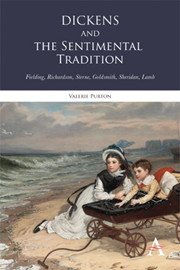Book contents
- Frontmatter
- Contents
- Acknowledgements
- A Note on the Text
- Introduction
- Chapter 1 Dickens and the Sentimentalist Tradition
- Chapter 2 Sentimentalism and its Discontents in the Eighteenth-Century Novel: Fielding, Richardson and Sterne
- Chapter 3 Sentimentalism and its Discontents in Eighteenth-Century Drama: Goldsmith and Sheridan
- Chapter 4 Dickens and Nineteenth-Century Drama
- Chapter 5 The Early Novels and The Vicar of Wakefield
- Chapter 6 The Later Novels
- Conclusion The Afterlife of Sentimentalism
- Notes
- Bibliography
- Index
Chapter 3 - Sentimentalism and its Discontents in Eighteenth-Century Drama: Goldsmith and Sheridan
Published online by Cambridge University Press: 05 November 2012
- Frontmatter
- Contents
- Acknowledgements
- A Note on the Text
- Introduction
- Chapter 1 Dickens and the Sentimentalist Tradition
- Chapter 2 Sentimentalism and its Discontents in the Eighteenth-Century Novel: Fielding, Richardson and Sterne
- Chapter 3 Sentimentalism and its Discontents in Eighteenth-Century Drama: Goldsmith and Sheridan
- Chapter 4 Dickens and Nineteenth-Century Drama
- Chapter 5 The Early Novels and The Vicar of Wakefield
- Chapter 6 The Later Novels
- Conclusion The Afterlife of Sentimentalism
- Notes
- Bibliography
- Index
Summary
‘Humanity, Sir, is a jewel. I love humanity.’
The plays of Oliver Goldsmith and of Richard Brinsley Sheridan officially depend for their power on their attacks on eighteenth-century sentimental comedy. Certainly their earliest critics believed this and the playwrights themselves registered their disapproval of the prevailing mode in two classic attacks on sentimentalism. Here is Goldsmith:
In these plays almost all the Characters are good, and exceedingly generous… If they happen to have Faults or Foibles, the Spectator is taught, not only to pardon, but to applaud them, in consideration of the goodness of their hearts. It is only sufficient to raise the characters a little, to deck out the Hero with a Ribband or give the Heroine a Title; then to put an insipid Dialogue, without Character or Humour, into their mouths, give them mighty good hearts…make a Pathetic scene or two, with a sprinkling of tender melancholy Conversation through the whole, and there is no doubt that all the Ladies will cry, and all the Gentlemen applaud.
Sheridan's sharpest attack is contained in a paean of praise to the rival Muse of Comedy:
Yet thus adorned with every grateful art
To charm the fancy and yet reach the heart –
Must we displace her? And instead advance
The goddess of the woeful countenance –
The sentimental muse! Her emblems view,
The Pilgrim's Progress, and a sprig of rue!
View her – too chaste to look like flesh and blood –
Primly portrayed on emblematic wood!
- Type
- Chapter
- Information
- Dickens and the Sentimental TraditionFielding, Richardson, Sterne, Goldsmith, Sheridan, Lamb, pp. 45 - 68Publisher: Anthem PressPrint publication year: 2012



